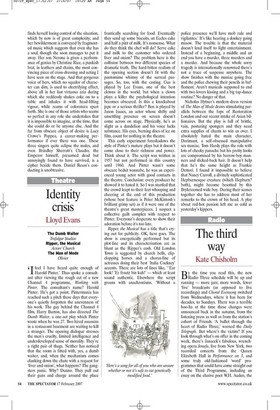Identity crisis
Lloyd Evans The Dumb Waiter Trafalgar Studios Ripper, the Musical Actors' Church The Man of Mode Olivier T feel I have heard quite enough of 1 Harold Pinter.' Thus spoke a consultant after viewing the rough cut of a new Channel 4 programme, Working with Pinter. The consultant's name? Harold Pinter. He's got a point. Pintermania has reached such a pitch these days that everyone's quietly forgotten the unevenness of his work. The guy behind the Channel 4 film, Harry Burton, has also directed The Dumb Waiter, a one-act play which Pinter wrote when he was 27. Two hired assassins in a restaurant basement are waiting to kill a stranger. The opening dialogue stresses the men's cruelty, limited intelligence and underdeveloped sense of morality. They're a right pair of thugs. Neither has noticed that the room is fitted with, yes, a dumb waiter, and, when the mechanism comes clanking down the chute with a request for 'liver and onion', what happens? The gangsters panic. Why? Dunno. They pull out their guns and charge around the place frantically searching for food. Eventually they send up some biscuits, an Eccles cake and half a pint of milk It's nonsense. What do they think the chef will do? Serve cake and milk to the customer who ordered liver and onion? The problem here is the collision between two different species of dramatic truth. The hard-bitten realism of the opening section doesn't fit with the pantomime whimsy of the surreal passages. So, too, with the casting. Gus is played by Lee Evans, one of the best clowns in the world, but when a clown plays a killer the psychological intention becomes obscured. Is this a knockabout jape or a serious thriller? Ben is played by Jason Isaacs, an actor whose shifty and unsettling presence on screen doesn't come across on stage. Physically, he's as slight as a dandelion and his voice lacks substance. His eyes, burning discs of ice on film, count for nothing in the theatre.
This early experiment foreshadows the style of Pinter's mature plays but it doesn't come close to their richness and power. Think about it. The script was written in 1957 but not performed in this country until 1960. And Pinter wasn't some obscure bedsit wannabe, he was an experienced young actor with good contacts in the theatre. Conclusion: every producer he showed it to hated it. So I was startled that the crowd leapt to their feet whooping and cheering at the end of this production (whose best feature is Peter McKintosh's brilliant grimy set) as if it were one of the theatre's great masterpieces. I suspect a collective guilt complex with respect to Pinter. Everyone's desperate to show their adoration before it's too late.
Ripper, the Musical has a title that's crying out for publicity. OK, here goes. The show is energetically performed but its plot-line and its characterisation are as blunt as the Ripper's cosh. Old London Town is suggested by church bells, clipclopping horses and a chorus-line of actresses doing their best 'Italia Cockney' accents. There are lots of lines like, "Ear look! 'Er froatz bin kuh!' — which at least sound authentic. Elsewhere the script groans with anachronisms. 'Without a police presence we'll have mob rule and vigilantes.' It's like hearing a donkey going miaow. The trouble is that the material doesn't lend itself to light entertainment. Instead of a beginning, a middle and an end you have a murder, three murders and a murder. And because the whole sorry tragedy is internationally renowned there's not a trace of suspense anywhere. The show finishes with the maniac going free and the police chewing their pencils in bafflement. Aren't musicals supposed to end with two lovers kissing and a big tap-dance routine? No danger of that.
Nicholas Hytner's modern-dress version of The Man of Mode draws stimulating parallels between the fops of Restoration London and our recent intake of Asian billionaires. But the play is full of brittle, vain, posturing spongers and they need extra supplies of charm to win us over. I absolutely hated the main character, Dorimant, a self-obsessed manipulative sex maniac. Tom Hardy plays the role with lots of cheeky panache but his pretty looks are compromised by his barrow-boy manners and slicked-back hair. It doesn't help that he's the same height as Frankie Dettori. I found it impossible to believe that Nancy Carroll, a divinely sophisticated Hepburnesque creature (which Hepburn? both), might become besotted by this Brylcreemed wide boy. During their scenes together she has to address most of her remarks to the crown of his head. A play about red-hot passion left me as cold as yesterday's kippers.

























































 Previous page
Previous page